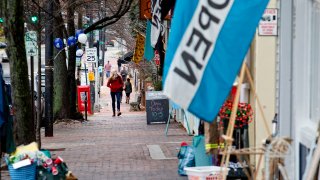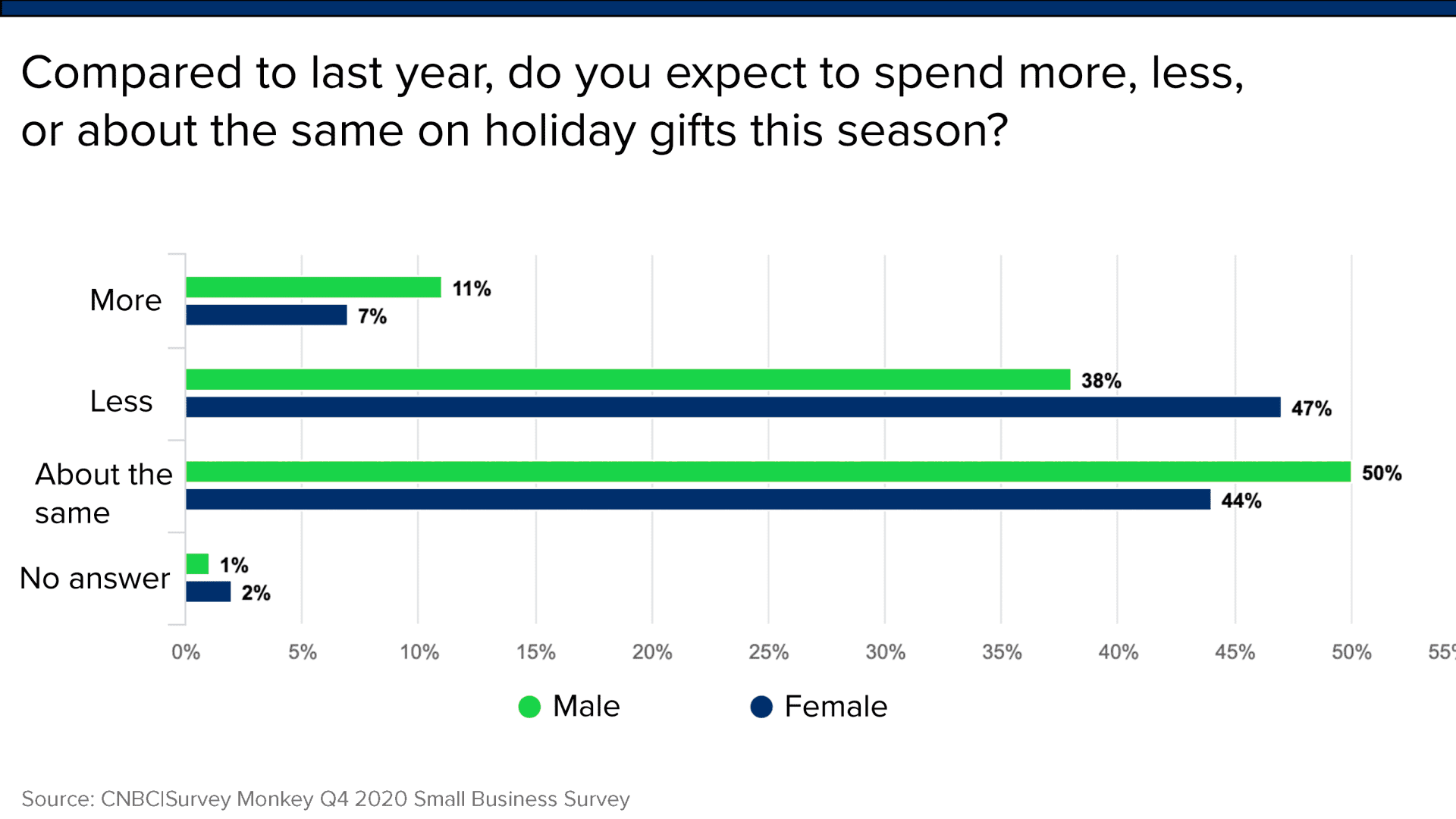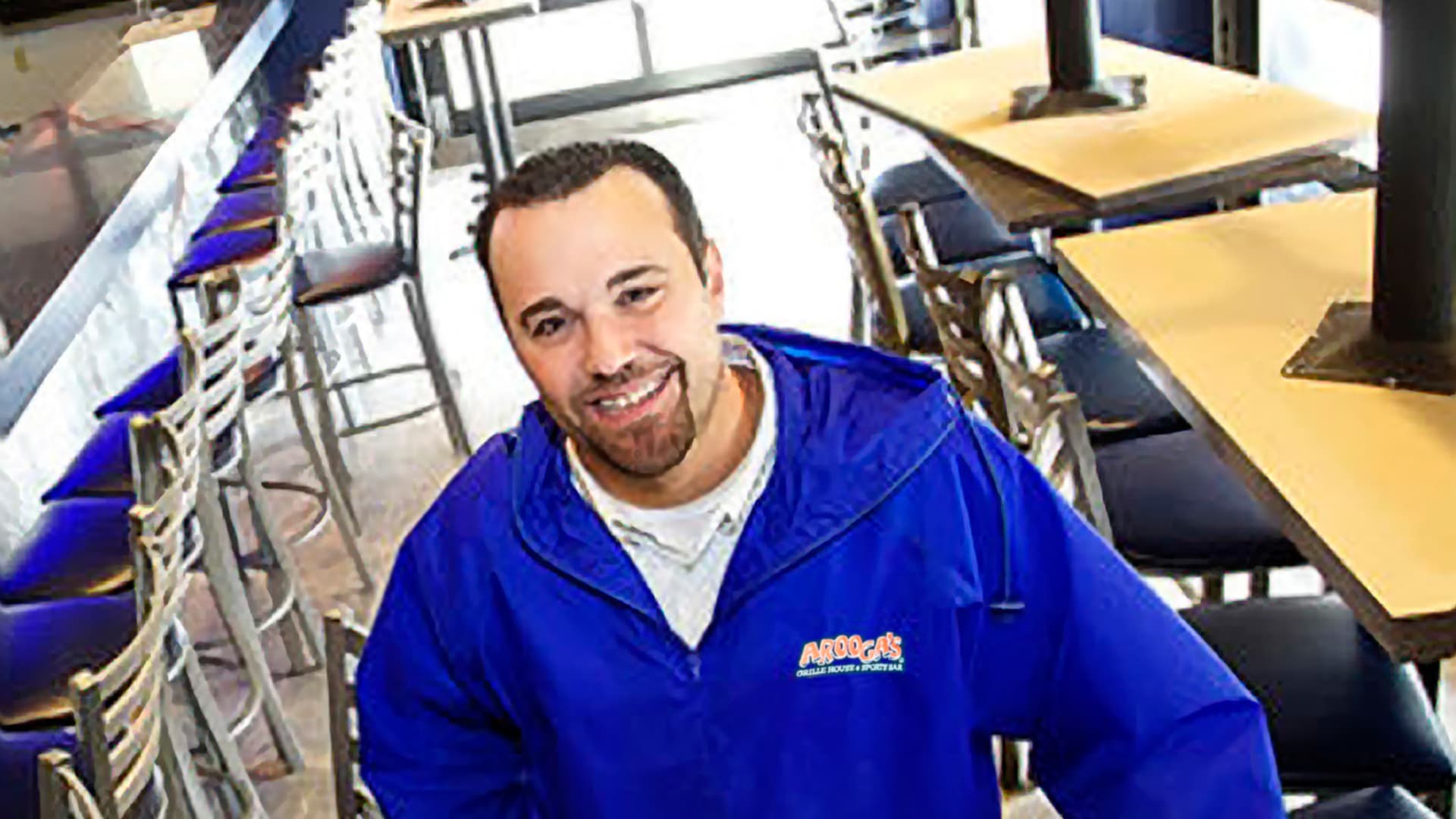
- As holiday shopping gets into gear this weekend, its uncertain how Small Business Saturday on Nov. 28 will move the needle and help the millions of business owners on Main Street struggling to survive.
- Forty-three percent of shoppers plan to spend less this holiday season than they did in 2019, and only 6% plan to spend the most money on Small Business Saturday, according to the Small Business Saturday Survey conducted by SurveyMonkey and CNBC.
- Roughly 75% small business owners have said that they need holiday spending to return to normal in order to stay in business in 2021, a recent study by American Express revealed.
As holiday shopping gets into gear this weekend, its uncertain how Small Business Saturday on Nov. 28 will move the needle and help the millions of business owners on Main Street struggling to survive. According to a Small Business Saturday Survey conducted by SurveyMonkey and CNBC, 43% of shoppers plan to spend less this holiday season than they did in 2019, and only 6% plan to spend the most money on Small Business Saturday.
The national study conducted from Nov.,16-18 released on Friday, surveyed 3,122 individuals age 18 to over 65. The survey was conducted using SurveyMonkey's online platform and based on its survey methodology.
This could be foreboding news for small business owners who are counting on holiday sales to recoup sagging revenues. Many are teetering on bankruptcy due to the coronavirus pandemic that has toppled normal business operations. And more shutdowns may be coming soon as Covid-19 infections rise throughout the U.S.
"It could be devastating for small business who rely on this blockbuster sales event," said Laura Wronski, a research scientist at SurveyMonkey who worked on the CNBC survey.

Roughly three in four (75%) small business owners have said that they need holiday spending to return to normal in order to stay in business in 2021, and almost half (46%) expressed the need for above average spending, according to the American Express Shop Small Impact study.
Money Report
The economic impact from this sales event is substantial. Small businesses benefit from increased sales during the busy holiday season, which in turn benefits the communities where they're located. According to American Express, 67 cents of every dollar spent at a small business—whether it's a retail store, restaurant or something else—stays in the community.
An estimated 110 million people participated in Small Business Saturday last year, and sales hit a record high with an estimated $19.6 billion in reported spending, according to American Express, which helped to create Small Business Saturday in response to the Great Recession.
While shoppers may be curbing spending in 2020, the CNBC/SurveyMonkey survey revealed that 30% of shoppers plan to patronize a small business on Small Business Saturday. That is down 9% from last year.
Surprisingly, 39% of all that activity will be in-person, 25% online and 34% both. One percent of respondents did not answer the question, the survey noted. Those numbers are vastly different than last year when 8% planned to shop online, 58% in-person and 33% planned to do both.
Strategies in the Covid economy
Considering the many challenges small business owners face, experts give tips on how they can drive sales during this key shopping day.
Most concur the best strategies include: boosting the company's online sales presence; implementing touchless transactions; introducing local delivery; creating customer gift lists, along with putting in place a range of new safety protocols in stores.
"The No. 1 thing small businesses need to do to drive sales on Small Business Saturday is prioritize health and safety for their customers," said Nick Starai, CSO of NMI, the payment platform used by 140,000 merchants and the behind-the-scenes payment enabler for Apple Pay and Google Pay. "No. 2 is to embrace touchless payment systems," he added.
"Our customer surveys show these are what consumers are looking for. They want to feel safer in small store environments. Many believe big box retailers have more safety and health protocols in place than small businesses. Business owners need to change the perception."
As he explains, there are simple things business owners can do such as having hand sanitizers at the register, using floor markers for social distancing, having employees wear face makes and sanitizing point-of-sale systems between customers that go a long way in boosting consumer confidence.
Gary Huether, Jr., an entrepreneur in the restaurant business – an industry severely impacted by the pandemic-- has taken a lot of measures to prepare for Small Business Saturday in hopes of a sales boost.
"We have had some of the toughest restrictions of any industry since the coronavirus crisis began and we are hoping our customers will come out and support us this weekend with indoor dining or takeout," says Huether, president and co-founder of Arooga's Grille House & Sports Bar, a franchisor of 18 locations in Connecticut, Rhode Island, Florida, Massachusetts, New York, New Jersey and Pennsylvania.

To attract business for the shopping holiday the company integrated direct deliveries on its website allowing guests to use Agrooga's loyalty and gift cards on their purchases. It also rolled out a mobile app for takeout and direct deliveries that allows for contactless payments.
"We have been in a whirlwind, faced with different restrictions that vary state-by-state. Some of our store sales are down 20% to 30%," he said, noting last year the company posted $40 million in revenues. "We are hoping our loyal customers will use Small Business Saturday to go out and help small businesses not the big box retailers."
Andy Shalal, CEO and founder of Busboys and Poets, a group of restaurants, cultural centers and bookstores in the D.C. metro area, is hopeful that community support will help Main Street during the holidays this season. He sees customers coming back again and again for takeout and book deliveries.
"Small business set the vibe in communities across America. People recognize how important they are to the local economy."
Recognizing their valuable contributions companies like Shopify and Facebook are trying to lend a helping hand to small businesses this weekend and throughout the holiday shopping season.
Shopify announced the #GiftBetter guide, a one-stop shop to find over 150 hand-selected gifts picked by curators like artist and floral designer, Maurice Harris; pro skater and entrepreneur, Michelle Steilen; world renowned chef, Matty Matheson; and actress and founder, Ally Maki, to name a few.
Recognizing that the black community was particularly hit hard, it also launched the Black Business Directory, which shoppers can use to discover and buy from Black Shopify merchants. Facebook has taken a similar approach with its #BuyBlack Friday program; encouraging people to support and shop with Black-owned businesses through the holidays and beyond.






